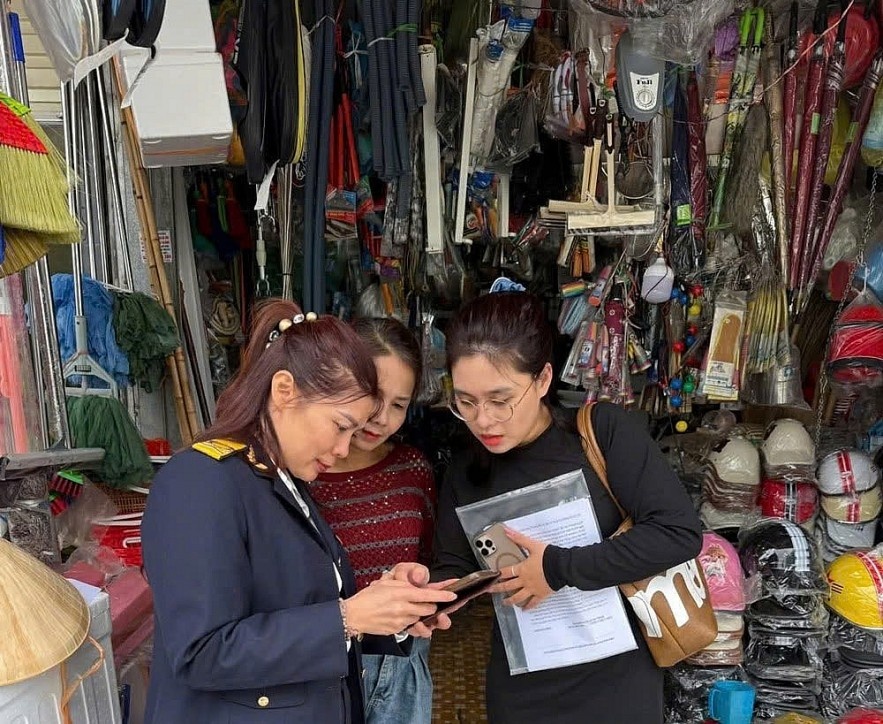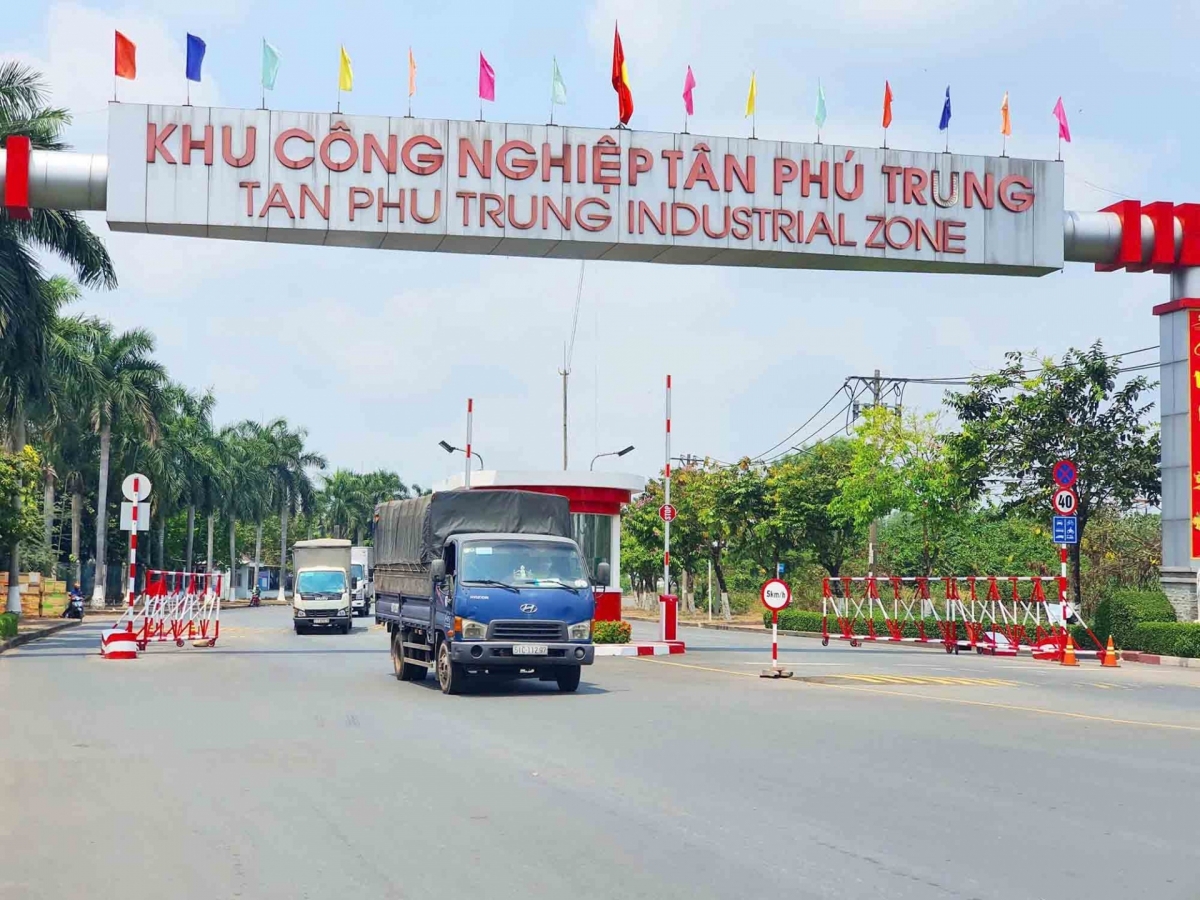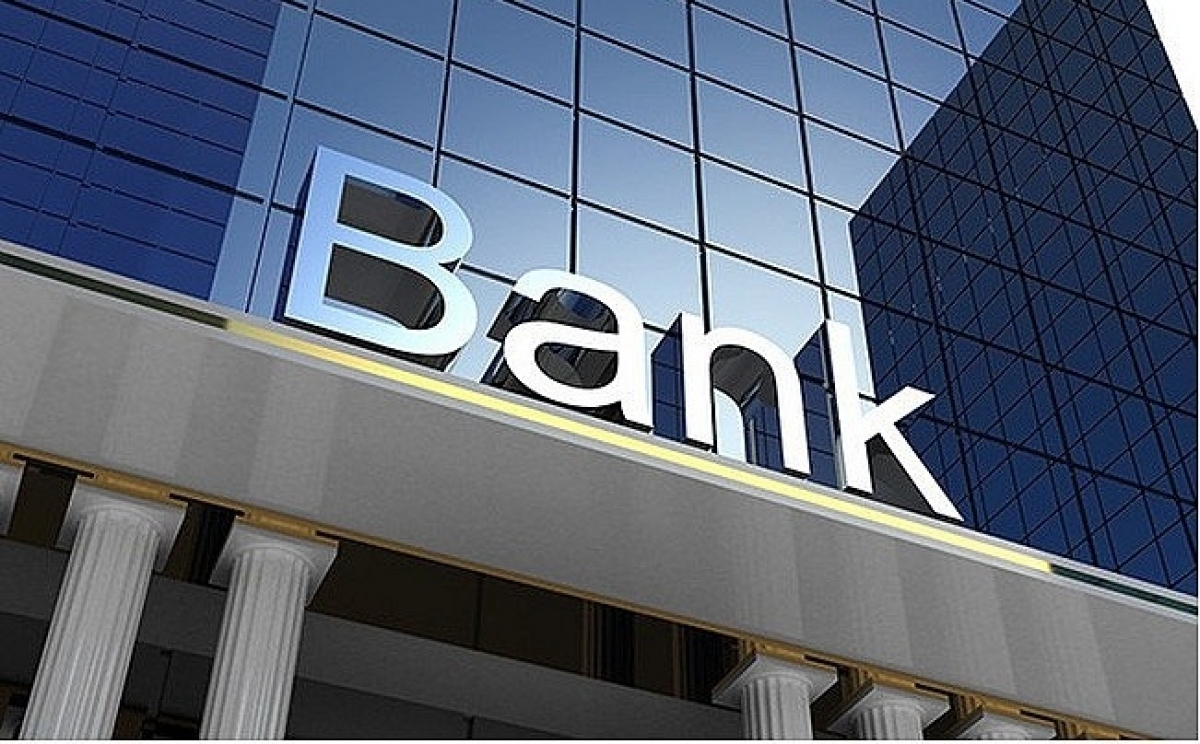INTERNATIONAL INVESTMENT
AND PORTAL
With just over a month remaining before the lump-sum tax is abolished on January 1, 2026, the tax authority has introduced a range of measures to support household businesses in transitioning to electronic tax filing. The move is seen as a key step towards greater transparency and more sustainable development of the private sector.
 Tax officials help a household business make its tax declaration and payment via the mobile platform. Photo: TN
Tax officials help a household business make its tax declaration and payment via the mobile platform. Photo: TN
At a tax digitalisation workshop in Hanoi on November 11, aimed at guiding household businesses through the switch to declaration-based taxation, Mai Son, deputy director general of the General Department of Taxation under the Ministry of Finance, highlighted that ending the lump-sum system and adopting e-filing is a strategic policy reflecting the Party and the state’s commitment to modernising tax administration.
“Our goal is not merely a technical rollout, but to ensure that every household business, including those in remote or disadvantaged areas, can access the policies, systems, and support resources they need,” said Son.
The tax authority currently manages more than 3.6 million household businesses, about two million of which will receive targeted assistance during the transition.
According to Mai Son, flexible measures will also be applied in areas affected by natural disasters or to vulnerable groups of household businesses, ensuring transparency in inspections and audits.
Meanwhile, Nguyen Thi Cuc, chairwoman of the Vietnam Tax Consultants’ Association (VTCA), said the shift from lump-sum taxation to declaration-based taxation is an inevitable step, aligned with the growth of e-commerce and digital payments.
“The lump-sum mechanism was suitable when infrastructure was limited, but it has revealed constraints as transactions now take place across multiple channels and platforms,” Cuc said. "Transparent declaration enables the state to manage taxes more effectively but also provides practical benefits to business owners, including the ability to deduct legitimate expenses, access preferential loans, and reduce legal risks."
“Household businesses should proactively keep records, collect invoices, and test the software. Voluntary declaration will help reduce risks,” she added.
The VTCA also noted that the Ministry of Finance and the Tax Department are reviewing and revising relevant circulars to simplify accounting requirements, tax declaration and support documents for household businesses, thereby smoothing the transition.
Nguyen Phu Tien, representative of the Digital Economy and Society Department under the Ministry of Science and Technology, said digital transformation in taxation is not just about adopting technology, but about reshaping governance models and business operations.
“Transparency is not about collecting more – it is about helping citizens become more stable. When data is clear, household businesses can access capital, support schemes, and partnership opportunities more easily,” he said.
The ‘60-day peak transition campaign’ launched by the tax authority via Decision No.3352/QD-CT dated October 31 is seen as an opportunity to strengthen ties among regulators, professional associations, and the household business community.
Partnerships between the government and technology companies are expected to help ensure that new policies are implemented in a practical, meaningful way.
Building on this reform momentum, many domestic tech companies have launched support programmes to help household businesses gain access to digital tools and become familiar with electronic filing.
At an event on November 11, tech company Sapo launched a free tax-management package known as Sapo 6870. The package includes digital sales management, e-invoice issuance and automatic tax declaration on mobile devices. Participating household businesses will receive 24 months of free software use, 2,000 e-invoices and a three-month digital-signature licence.
Other technology providers such as Misa, Bkav, and Viettel are joining the effort.
Experts believe that abolishing the lump-sum tax will provide a crucial foundation for Vietnam to build a data-driven tax system, reduce revenue losses, and increase fairness across economic sectors.
However, for the policy to truly take hold, the most critical factor remains the preparedness of taxpayers and the collective support of all stakeholders.
The joint involvement of the tax sector, professional associations, and technology companies signals a new approach – one that places partnership at the centre, rather than focusing solely on enforcement.
 HCM City’s tax authority suspends enforcement decision against Sabeco
HCM City’s tax authority suspends enforcement decision against Sabeco
The Tax Department of HCM City has decided to suspend its decision to collect VND3.14 trillion (US$134.8 million) from Sai Gon Beer-Alcohol-Beverage Corporation (Sabeco) for the company’s special sales tax violations.
 Tax authority returns nearly $3 billion in VAT
Tax authority returns nearly $3 billion in VAT
In the first seven months of 2023, Vietnam's tax authority has refunded $2.93 billion in VAT to businesses, with 80 per cent of the refunds made under the refund first, audit later scheme.
 Overhaul of tax sector boosts operational effectiveness
Overhaul of tax sector boosts operational effectiveness
The tax sector has embarked on a major restructuring and efficiency drive to strengthen service delivery for citizens and businesses.



















